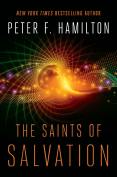Some years have passed since the events of Ready Player One. Wade is the richest man in the world, but he is not doing well. After the High Five gained control of Gregarious Simulation Systems, Wade found a new message from Halliday, revealing the existence of a neural interface system allowing the user to experience the Oasis simulation “directly” in the brain, without the need for visual, aural, and haptic devices. This changed the world, again, but also led to Samantha breaking up with Wade. She thought it was a terrible idea to implement. He is now a recluse, spending all his time in his enormous mansion, and twelve hours a day logged into the Oasis via his neural interface rig.
At this point, Wade’s problems amount to no more than the self-inflicted emotional suffering of a billionaire who made poor personal life choices. However, a new threat looms. An AI left behind by Halliday appears, threatening the Oasis and everyone logged in to it.
I must confess to being ready for disappointment with this book. How could Mr. Cline possible put the protagonist in straits that felt authentically dire when all his dreams were fulfilled at the end of the first book? I should not have worried. It all comes crashing down, and just when you think matters can’t get worse, they do. What follows is another treasure hunt with high stakes, but the emotional underpinnings are quite different from the egg hunt in the first book. It also reveals some dark secrets from the past.































